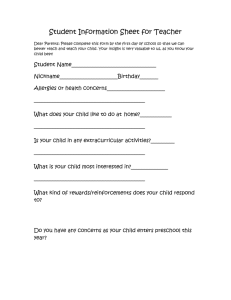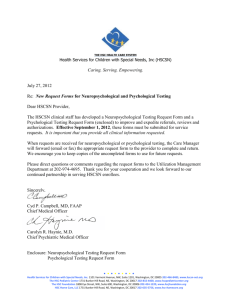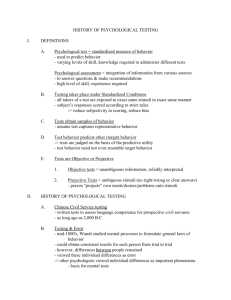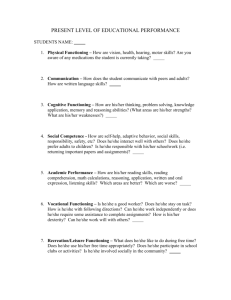Diagnostic Testing - Work-Life - Office of Work/Life
advertisement
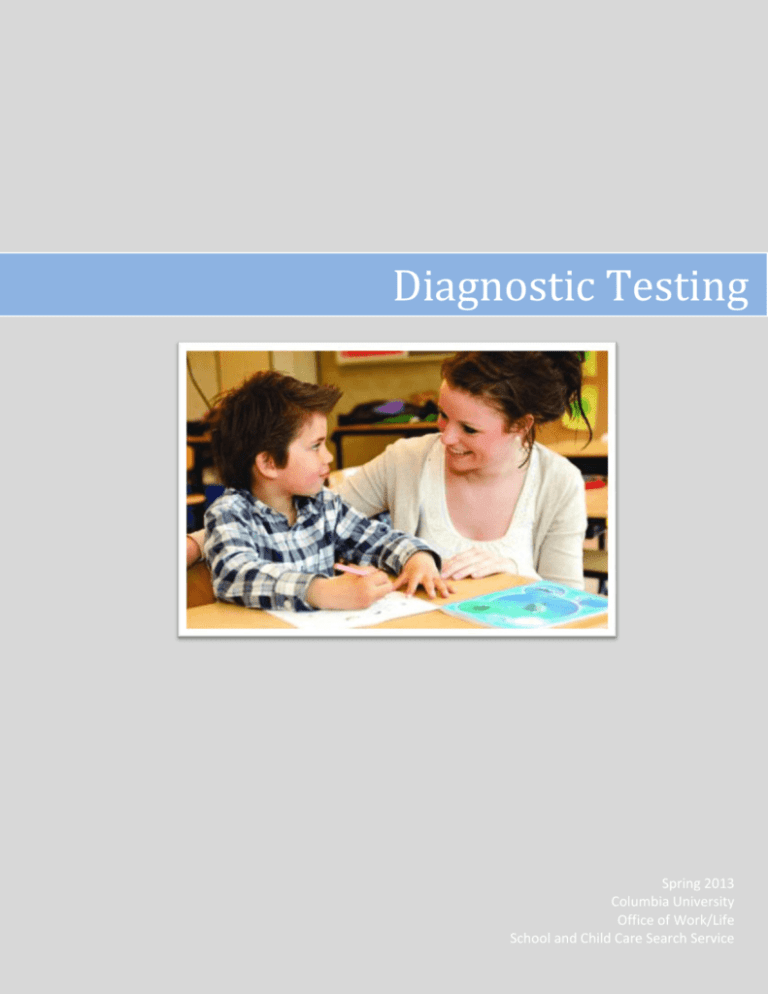
Diagnostic Testing Spring 2013 Columbia University Office of Work/Life School and Child Care Search Service Diagnostic Testing Information on the different kind of assessment Psychological Evaluation A psychological evaluation is a set of assessment procedures administered by a licensed psychologist to obtain information about a student's learning, behavior, or mental health. Evaluations can be conducted to identify significant mental health concerns, determine your readiness for a surgical evaluation, help develop instructional or behavior plans for your child, or determine eligibility for gifted programs, school readiness, or special education. Within the context of the school setting, families may request an evaluation for their child in order to determine if the student requires, by law, additional supports or interventions in order to modify the educational programming to meet their individual needs This evaluation may include cognitive and academic assessments, Classroom Observation, Social History, and measures of adaptive functioning. Cognitive assessments measure a student’s intellectual abilities. It gives general information relative to other students the same age. The test shows how well he problem solves, how he best interprets information (visual, auditory, etc.), and measures other areas such as Types of psychological tests IQ tests IQ tests purport to be measures of intelligence, while achievement tests are measures of the use and level of development of use of the ability. IQ tests which contain a series of tasks typically divide the tasks into verbal (relying on the use of language) and performance, or non-verbal (relying on eye–hand types of tasks, or use of symbols or objects). Ex. WAIS-IV, WISC-IV, Cattell Culture Fair III, Woodcock-Johnson Tests of Cognitive Abilities-III, Stanford-Binet Intelligence Scales V Personality tests Objective tests (Rating scale or self-report measure) Objective tests have a restricted response format, such as allowing for true or false answers or rating using an ordinal scale. Ex. the Minnesota Multiphasic Personality Inventory, Millon Clinical Multiaxial InventoryIII, Child Behavior Checklist, BASC-2, Conner’s Rating Scale and the Beck Depression Inventory. Projective tests (Free response measures) Projective tests allow for a freer type of response. An example of this would be the Rorschach test, in which a person states what each of ten ink blots might be. Ex. the Thematic Apperception Test (TAT), the House-Tree-Person Test, the Animal Metaphor Test, the Roberts Apperception Test, and the Attachment Projective. Both "rating scale" and "free response" measures are used in contemporary clinical practice, with a trend toward the former. Direct observation tests Although most psychological tests are "rating scale" or "free response" measures, psychological assessment may also involve the observation of people as they complete activities. This type of assessment is usually conducted with families in a laboratory, home or with children in a classroom Educational/Academic Assessment This is an assessment that compares a student’s academic functioning with other students of the same age. The test usually focuses on Reading, Writing, Math, and Oral Language. It looks at several areas within each major area. For example, in reading there will be a subtest measuring comprehension, recognizing site words, and speed of reading. This test focuses on broad skills that a student should know, rather than testing exactly what is taught in class. Assessment of achievement is an important part of assessment to rule out/diagnose learning disabilities and mental retardation. Academic achievement tests: (e.g. WIAT, WRAT, Woodcock-Johnson Tests of Achievement-III) Psycho/educational assessment When the psychological and educational testing are included in an overall assessment of a person it is called a psycho/educational assessment. Neuropsychological Evaluation This evaluation consists of specifically designed tasks used to measure a psychological function known to be linked to a particular brain structure or pathway. Neuropsychological tests can be used in a clinical context to assess impairment after an injury or illness known to affect neurocognitive functioning. When used in research, these tests can be used to contrast neuropsychological abilities across experimental groups. Areas of assessment: • Intellectual Functioning • Academic Achievement • Social/Emotional/Behavioral • Language Functioning • Attention/Concentration • Executive Functioning • Sensorimotor Functioning • Visual Spatial/Visual Motor/Visual Perception • Learning and Memory Example of tests Developmental Nueropsychological Assessment – Second Editon (NEPSY-II) Wide Range Assessment of Memory and Learning, Second Edition (WRAML-2) Delis–Kaplan Executive Function System ( D-KEFS ) Dean-Woodcock Neuropsychological Battery, Infant and Preschool Assessment Due to the fact that infants and preschool aged children have limited capacities of communication, psychologists are unable to use traditional tests to assess them. Therefore, many tests have been designed just for children ages birth to around six years of age. These tests usually vary with age respectively from assessments of reflexes and developmental milestones, to sensory and motor skills, language skills, and simple cognitive skills. Common tests for this age group are split into categories: Infant Ability Common infant ability tests include: Gesell Developmental Schedules (GDS) which measures the developmental progress of infants, Neonatal Behavioral Assessment Scale (NBAS) which tests newborn behavior, reflexes, and responses, Ordinal Scales of Psychological Development (OSPD) which assesses infant intellectual abilities, and Bayley-III which tests mental ability and motor skills. Preschool Intelligence Common preschool intelligence tests include: McCarthy Scales of Children’s Abilities (MCAS) which is similar to an infant IQ test, Differential Ability Scales (DAS) which can be used to test for learning disability, Wechsler Preschool and Primary Scale of Intelligence-III (WPPSI-III) and Stanford-Binet Intelligence Scales for Early Childhood which could be seen as infant versions of IQ tests, and Fagan Test of Infant Intelligence (FTII) which tests recognition memory. School Readiness Finally, some common school readiness tests are: Developmental Indicators for the Assessment of Learning-III (DIAL-III) which assesses motor, cognitive, and language skills, Denver II which tests motor, social, and language skills, and Home Observation for Measurement of Environment (HOME) which is a measure of the extent to which a child’s home environment facilitates school readiness. Infant and preschool assessments, since they do not predict later childhood nor adult abilities, are mainly useful for testing if a child is experiencing developmental delay or disabilities. They are also useful for testing individual intelligence and ability, and, as aforementioned, there are some specifically designed to test school readiness and determine which children may struggle more in school.
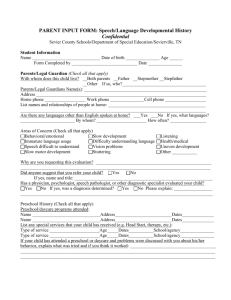
![Service Coordination Toolkit Transition Planning Checklist [ DOC ]](http://s3.studylib.net/store/data/006933472_1-c85cecf2cfb8d9a7f8ddf8ceba8acaf8-300x300.png)

